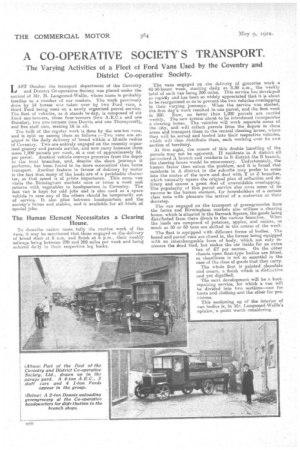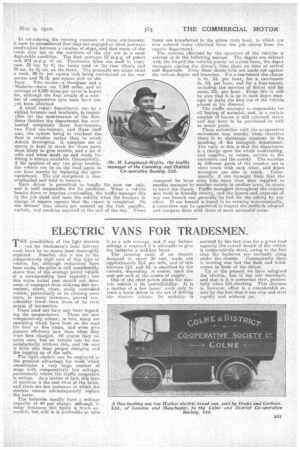A CO-OPERATIVE SOCIETY'S TRANSPORT.
Page 22

Page 23

If you've noticed an error in this article please click here to report it so we can fix it.
The Varying Activities of a Fleet of Ford Vans Used by the Coventry and District Co-operative Society.
LAST October the transport department of the Coventry and District Co-operative Society was placed under the control of Mr. H. Langmead-Wallis, whose name is probably familiar to a number of our readers. The work previously dove by 14 horses was taken over by two Ford vans, a third Ford being used on a newly organized parcel service. The fleet of vehicles, as it stands to-day, IS composed of six Ford one.tenners, three 1 our-tonners (two A.E.C.s and one Dahnier), two two-tonners (one Dennis and one Thornycroft), and five staff ears, making 16 in all.
The bulk of the regular work is done by the one-ton vans, and is split up among them as follows :—Two vans are engaged in the daily detivery of bread within a. I2-mile radius of Coventry. Two are entirely engaged on the recently organized grocery and parcels service, and now carry between them some 1,200 parcels per week, at a cost of approximately 2d, per parcel. Another vehicle conveys groceries from the depot to the local branches, and, despite the short journeys it performs, has been found to be more economical than horse transport. Another feature in favour of delivery by motor is the fact that many of the loads are of a perishable character, so that speed is of prime importance. This same van visits the Birmingham markets once or twioe a week and returns with vegetables to headquarters in Coventry. The last van is kept for odd jobs and is also used as a spare vehicle in case any of the others should be temporarily aut of service. It also plies between headquarters and the society's farms and stables, and is available for all kinds of special jobs.
The Human Element Necessitates a Clearing House.
To describe rather more fully the routine work of the vans, it may be mentioned that those engaged on the delivery of bread start at 8 a.m, and finish at 6 p.m., their weekly mileage being between 270 and 280 miles per week and being entered daily in their respective log books. The vans engaged on the delivery of groceries work a 49-50-hours week, starting daily at 8.30 a.m., the weekly total of each van being 300 miles. This service has developed so rapidly and has been so widely appreciated that it is about to be reorganized so as to prevent the two vehicles overlapping in their varying journeys. When the service was started, the first day's work resulted in one parcel, and the first week in 200. Now, no fewer than 1,200 parcels are carried weekly. The new system about to be introduced incorporates a clearing house. The vehicles will work separate areas of the city, and will collect parcels from the depots in these areas and transport them to the central clearing house, where they will be sorted and loaded into their respective vehicles, which will then distribute them, each working over its own section of territory.
At first sight, the reason of this double handling of the parcels may not be apparent. If residents in A district all patronized A branch and residents in B district the B branch, the clearing house would be unnecessary. Unfortunately, the human factor then enters the problem, and it is found that residents in A district in the suburbs may prefer to come into the centre of the town and deal with Y or Z branches, which naturally upsets the original plan of collection and delivery and causes a great deal of unavoidable overlapping. The popularity of this parcel service also owes some of its success to the human element, for householders of a certain class note with pleasure the arrival of a motorvan at their doorstep.
The van engaged on the trans-port of greengroceries from the farms and Birmingham markets also utilizes a clearing house, which is situated in the Barrack Square, the goods being distributed from there direct to the various branches. When the loads are composed of potatoes, apples, and onions, as much as 50 or 60 tons are shifted in the course of the week.
The fleet is equipped with different forms of bodies. The bread and parcel vans are closed in, the former being equipped with an interchangeable form of body, which not only increases the dead load, but makes the cad liable for an extra tax of £7 per annum. On the other chassis open float-type bodies are fitted, as cleanliness is not so essential in the case of the class of goods that they carry.
The whole fleet is painted chocolate and cream, a finish which is distinctive and yet dignified. The next development will be a bootrepairing service, for which a van will be divided into two sections--one for boots and clothing and the other for provisions.
This sectioning up of the interior of van bodies is, in Mr. Langmead-Wallis's opinion, a point worth considering. In considering the running expenses of these ciae-tonners, it must be remembered that they are cogs-god on short journeys sandwiched between a number of stops, and that many of the roads they use on the outskirts of the eity are in a most deplorable condition. The fleet averages 12 m.p.g. of petrel and 2C0 m.p.g. of oil. Pneumatic tyres aroused in every case, 32 iris. by 4,1, ins, being used on the rear wheels and 30 ins, by 3i ins, on the front.The pressurbs are taken twice a week, 90 lb. per square inch being mairitaiiied on the rear covers and 75 lb. per square inch on the front. Two covers—a Goodyear and a Michelin—have run 7,000 miles, and an average of 6,000 Miles per cover is hoped for, although the final results of a number of comparative tyre teats have not yet been obtained A small repair department, run, by a sleillecl foreman and mechanic, is responsible for the maintenance of the fleet. Since October the department. has over hauled completely three four-tonners, two Ford -onedenners, and three staff ears, the system 'being to overhaul the fleet in rotation rather than to await defects developing. A complete set of spares is kept in stock for those parts most likely to give trouble, and a set of coils and wires made up and ready for fitting is always available. Consequently, if the ignition of any van gives trouble, the vehicle can be on the road again in one hour merely by replacing the spare equipment. The old equipment is there overhauled and held in reserve.
Each driver is permitted to handle Ids own ear only, and is held responsible for its condition. When a vehicle breaks down or requires overhauling, the traffic manager fills in the job sheet and tests the vehicle when the foreman in charge of repairs reports that the repair ie completed. On the drivers' time sheets are eutered up the fuel, paraffin, carbide, and sundries required at. the end of the day. These items are transferred to the prime costs book, in which are also entered items obtained from the job .sheets from the repairs depertment.
The revenue obtained by the operation of the vehicles is arrived at in the following manner. The depots are debited with the hireinf the vehicles purely on a time basis, the depot managers signing the driver's time sheet. on time of arrival and cle.parlame. From there sheets bills are made out against the various depots and branches. For a one-tanner the charge is 6s. 3d. per hour, for a two-tanner us. 2d. per hour; and for a four-tanner, including the services of driver and his mate, 10s. per hour. From this it will he seen that it is up to each depot manager to make the best use of the vehicle placed at his disposal.
The traffic manager is. responsible for all buying of material,, and, as e certain number of horses is still retained, straw and bay have to be purchased as well as motor parte.
Those unfamiliar with the co-operative movement may wonder what incentive there is to endourage economy in the handling of the transport department. The reply to this is that the department is a charge upon the whole undertaking, and supplies, in return, service to the customers and the society. The societies in different parts of the country are in close touch with each other, and depot managers are also in tench. Consequently. if one manager finds that the transport he hires costs himmore than that supp,lied to another manager by another society in another town he wants to know the reason. Traffic managers throughout die country also work in friendly ritialry, and the figures and expenses of any one branch can generally be had for the asking by any other. If one branch i.e found to be running uneconomically, 4 committee may be appointed to inspect the methods adopted and compare them with those of more successful areas.




































